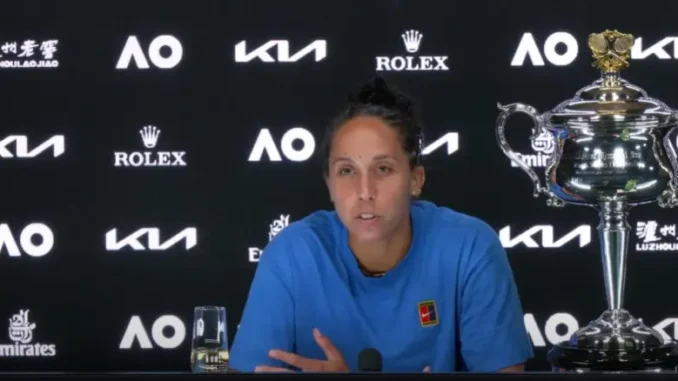
Madison Keys, one of the brightest stars in women’s tennis, recently revealed the role of her therapist in helping her navigate the intense pressures of competing at the Australian Open. The American, known for her powerful groundstrokes and calm demeanor on court, spoke candidly about how seeking professional support has been pivotal in maintaining her mental health during one of the most grueling tournaments on the tennis calendar.
For athletes like Keys, the physical demands of the sport are only one side of the equation. The mental strain of competing at the highest level, especially in a Grand Slam environment, can often be overwhelming. In a refreshing display of vulnerability, Keys shared her experiences of reaching out to her therapist during the tournament to help manage the emotional toll that comes with the game.
“Sometimes, you just need someone to remind you that you’re more than the wins and losses,” Keys said, reflecting on her decision to make the call. “There’s so much pressure to perform and meet expectations, but having that outlet has been incredibly helpful for me.”
Keys’ openness about her mental health journey is a testament to the growing recognition of the psychological challenges faced by athletes. In recent years, sports figures from various disciplines have been more vocal about the importance of mental well-being, breaking down stigmas and encouraging others to seek help when needed.
For Keys, the decision to call her therapist wasn’t just about addressing immediate concerns but also about maintaining a balanced perspective throughout the tournament. “It’s easy to get caught up in the moment and feel like everything is riding on one match or one point,” she explained. “Having someone to talk to helps you step back and see the bigger picture.”
The Australian Open, like any Grand Slam, is an event that pushes players to their limits. With matches often stretching late into the night, the relentless schedule, and the high stakes, the environment can be both physically and mentally exhausting. Keys’ decision to prioritize her mental health underscores the importance of self-care in such a demanding context.
As a player who has experienced both the highs and lows of professional tennis, Keys is no stranger to the pressures of the sport. From reaching the final of the US Open to enduring early exits in other tournaments, her career has been a rollercoaster of emotions. Through it all, she has remained committed to finding ways to stay grounded and focused, even in the face of adversity.
“I’ve learned that it’s okay to ask for help,” Keys said. “There’s no shame in admitting that you’re struggling or that you need someone to talk to. It’s part of being human.”
Her comments come at a time when the conversation around mental health in sports is gaining momentum. High-profile athletes, including Naomi Osaka and Simone Biles, have brought the issue to the forefront, inspiring a broader dialogue about the importance of mental well-being. Keys’ decision to share her story adds to this growing movement, highlighting the need for resources and support systems for athletes at all levels.
Fans and fellow players have praised Keys for her honesty, noting that her willingness to speak openly about her experiences sets an example for others. Social media has been abuzz with messages of support, with many commending her for normalizing conversations about mental health.
While the specifics of her discussions with her therapist remain private, Keys emphasized the positive impact of having someone to turn to during challenging moments. Whether it’s addressing pre-match nerves, managing the disappointment of a loss, or simply finding perspective amid the chaos, her therapist has been a crucial part of her support team.
“I think people sometimes forget that athletes are people too,” Keys said. “We have our own struggles, insecurities, and fears. Just because we’re on a big stage doesn’t mean we’re immune to those things.”
Keys’ journey is a reminder that success in sports isn’t just about physical prowess or technical skill; it’s also about mental resilience and emotional well-being. By prioritizing her mental health, she’s not only enhancing her performance on the court but also setting a powerful example for others to follow.
Looking ahead, Keys hopes that her story will encourage more athletes to seek the help they need and to view mental health as an integral part of their overall performance. “I want people to know that it’s okay to not have it all figured out,” she said. “What matters is that you’re taking steps to take care of yourself and keep moving forward.”
As the tennis world continues to evolve, the emphasis on mental health is becoming increasingly important. Players like Keys are leading the charge, proving that vulnerability and strength go hand in hand. Her decision to open up about her experiences is a testament to her character and a reminder that true greatness extends beyond the court.
For Keys, the journey is far from over, but her commitment to her mental well-being ensures that she’s equipped to face whatever challenges lie ahead. Whether she’s competing for a Grand Slam title or simply navigating the ups and downs of professional tennis, her story serves as an inspiration to all who face their own battles, both on and off the court.
Leave a Reply